Partials & Dentures – Springfield, NJ
Fill in the Gaps for Good
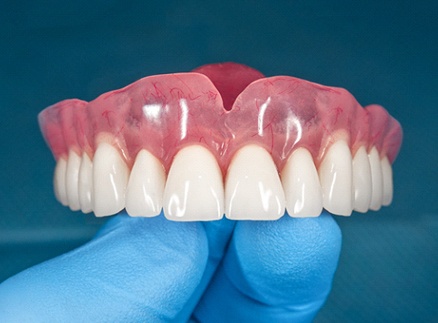
Innovations in dentistry and technology allow patients today to preserve their teeth unlike ever before. However, tooth loss is still a common problem affecting Americans today. In fact, 120 million U.S. adults are missing at least one tooth! Unfortunately, this can make smiling, eating, and speaking difficult, which is why our team at Skyline Dental offers partials and dentures in Springfield! If you are missing one or more teeth, don’t hesitate to contact our office today to fill in the gaps for good!
Why Choose Skyline Dental For Partials and Dentures?
- Custom-Made Treatment for Natural-Looking Results
- State-of-the-Art Facility
- Accept All PPO Dental Insurance Plans
Why Replace Missing Teeth?
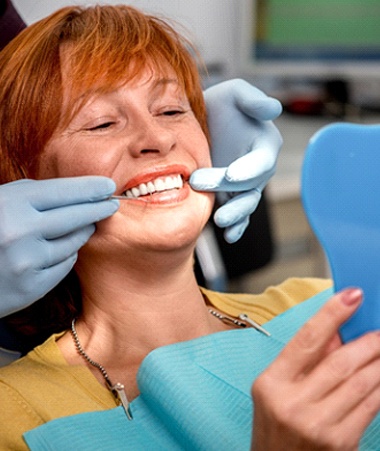
If you can’t see your missing teeth or their absence hasn’t hindered your quality of life yet, you may be wondering why you need to replace them at all. However, it is important to remember that the effects of tooth loss go deeper than appearance. Once the crown and root are gone, bone loss is inevitable. This can lead to changes in your facial structure that cause premature wrinkling and saggy skin. Plus, the loss of support can cause the adjacent teeth to shift out of place, become loose, or fall out altogether.
Who's a Good Candidate for Dentures?

When committing to any sort of dental treatment, it’s important to make sure that it’s truly right for you. Dentures have helped many individuals overcome the challenges associated with missing teeth, but are they the best option in your specific case? Our team is here to help you figure out the answer to that question. Set up a consultation with us today so that we can take a look at your mouth and discuss your candidacy for custom-made dentures.
Read More
Effects of Missing Teeth
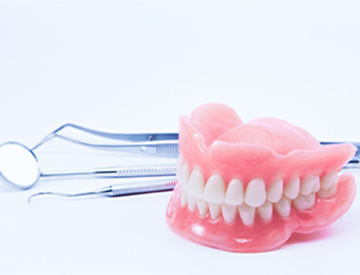
While it is often possible for you to keep your natural teeth for your entire life, issues such as gum disease, tooth decay, and physical trauma involving the mouth can leave you with an incomplete smile. Losing any number of teeth tends to come with a variety of consequences. For example:
- Chewing may become more difficult, forcing you to cut all kinds of foods out of your diet.
- The lack of support from your teeth and the associated bone loss can lead to facial sagging.
- Enunciating your words can be more challenging when you don’t have a full set of teeth.
- Missing teeth can leave gaps in your smile, thus negatively impacting your appearance as well as your confidence.
What Qualifies You for Dentures?

You may want to consider getting dentures if any of the following describe you:
- You have lost most or all of the teeth in one or both arches.
- You are suffering from extensive tooth decay and will need multiple extractions in the near future.
- Your jawbone and gum tissue are in good enough health to support dentures.
- You are diligent about practicing good oral hygiene and can commit to taking excellent care of your dentures and your mouth on a daily basis.
Once we’re sure that you’re a viable candidate for dentures, we can help you figure out which kind of prosthesis you should get. Partial dentures, full dentures, and implant dentures all have benefits that are worth considering; the kind that’s best for you depends on the number of teeth in need of replacement as well as other factors.
Alternative Tooth-Replacement Options
Despite the many benefits associated with dentures, there may be cases where you find that they simply aren’t a viable option for you. However, there are other ways to replace your missing teeth, and you can count on our team to help you figure out which treatment you should pursue. Here’s a look at your choices:
- Dental Bridges: Traditional dental bridges are anchored to two of your natural teeth in order to fill the gap between them. Before placing a dental bridge, we’ll need to check the teeth in question to make sure that they’re in good enough shape to support the prosthesis.
- Dental Implants: Dental implants can keep crowns, bridges, or dentures anchored to your jaw in order to replace any number of teeth. Our team can complete the entire dental implant procedure under a single roof.
What Are My Treatment Options?

All too often, patients think of partials and dentures as the obvious, obtrusive appliances their grandparents wore decades prior. However, thanks to high-quality materials and the latest techniques, Dr. Henkin custom-makes prosthetics that look life-like, feel realistic, and last much longer. Depending on your unique smile needs, you may need:
Read More
Partials
Dentures
If you are missing an entire arch of teeth, then a full denture can be made with all-ceramic teeth. A suction or adhesive will be used to secure it in place against your gum tissue, resulting in minimal slipping and movement.
Implant-Retained
Implant-retained dentures are a state-of-the-art tooth replacement alternative to partials or dentures. By anchoring your new teeth into the jawbone, you can enjoy the durability that dental implants are known for while simultaneously preserving your bone density. At your initial consultation, Dr. Henkin will discuss the whole process and ensure you are a candidate.
How Dentures are Made
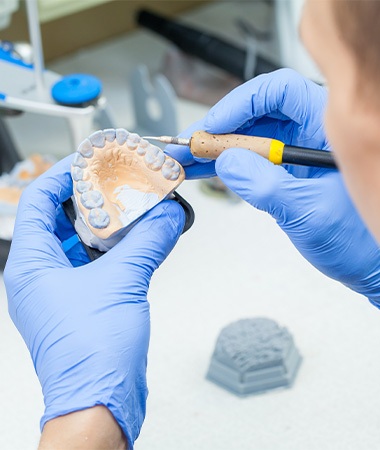
Ahead of an actual treatment, you may want to learn how dentures are made. Knowing what went into your new teeth would help you respect them in the long run. Even so, finding the relevant facts on denture creation and the steps involved is often hard. The good news is that Skyline Dental has addressed the problem and made a summary of this matter. To learn how dental labs make dentures, please keep reading or call us for details.
Read More
What are Dentures Made Of?
Whether dentures are partial or full, they all have two crucial parts: a base and artificial teeth. These things comprise any denture and ensure the restoration works. As for their traits, consider those below:

- Denture Base – The base is the core structure that supports a denture’s teeth. As such, it’s made of acrylic, nylon, porcelain, resin, or metal. Full and partial dentures mostly use acrylic bases, though nylon can work as well.
- Artificial Teeth – A denture’s artificial teeth (per their name) are its tooth-replacing portions. To that extent, they’re made from resin or porcelain that matches your enamel’s color.
The Denture Creation Process
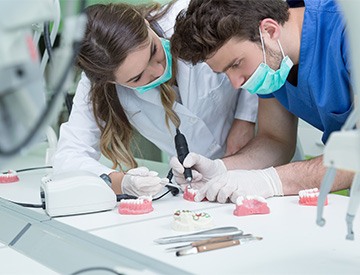
Any and every denture is custom-made for a patient, so making each one involves a multi-step process. The required steps are:
- Step 1: Dr. Henkin will take a dental impression of your mouth. That way, she can make a plaster model that matches your future denture’s size and shape.
- Step 2: Our dental team will send the model to a lab, which uses it to create a wax gumline.
- Step 3: After making the wax gumline, lab workers will set artificial teeth in it. They’ll then have made a prototype denture to use for the final one.
- Step 4: We’ll receive the prototype denture and see if it fits your mouth. Afterward, we’ll return it to the dental lab that crafts your restorations.
- Step 5: A worker will place the prototype in a flask after boiling it to remove its wax. As for the flask, this object will receive plaster and sit in hot water.
- Step 6: A separator will go into the plaster layer, keeping the acrylic from sticking. This material will be injected into the flask to replace the wax.
- Step 7: Lab workers will remove all plaster to reveal the final denture. Later, they’ll place the restoration in a bath to remove its residue.
- Step 8: Workers will cut off the denture’s excess acrylic, followed by briefly polishing it.
- Step 9: You will have your final denture fitted. At that time, the dentist will adjust it to work smoothly.
Adjusting to Your New Dentures

You’ll likely feel some mild discomfort when you first get dentures. Rest assured, this symptom is normal – your mouth just needs time to adjust to your new teeth. Once you’ve had the prosthetics for a few weeks, they should feel more familiar.
All that said, you can take steps to speed up the adjustment. One method is to exercise your facial muscles; you’d strengthen them to handle dentures. Alternatively, you could eat soft foods (to avoid pain) or use adhesives (to enhance security). Through these and similar actions, you’d adjust to your dentures even more quickly.
If your denture pain persists, please contact us at once. Your new prosthetics may need further alterations.
The Benefits of Dentures

Missing teeth can impact your life in a major way because things that once were second nature to you, like speaking and eating, unexpectedly become much more challenging. Fortunately, Dr. Henkin can provide durable, lifelike dentures to rebuild your grin. These prosthetics provide many helpful advantages that restore your smile’s functionality and appearance simultaneously.
Continue reading below to learn more about how your dentures can benefit you, and feel free to contact us for more information.
Read More
Psychological Benefits

You probably didn’t choose to lose your permanent teeth, and many people struggle to accept the sudden changes that come with gaps in your grin. You might develop anxiety or depression if you’re overly concerned about how you’ll be perceived. This can lead to less interest in engaging with other people, leading you to avoid social interactions.
Dentures can boost your confidence because with them in place, you’ll have a complete set of teeth, so you look and feel much more like yourself.
Clearer Enunciation

Your tongue presses against your teeth in specific ways to form the variety of sounds and words that you rely on to communicate. If some are missing, you’re more likely to have a lisp or other challenges in your speech patterns.
Once you’ve been fitted with dentures, it can take about a month for your tongue and other muscles to adjust. Then, with some time, patience, and practice, you’ll be able to converse as clearly as ever!
Improves Nutrition

Tooth loss can also significantly impact general well-being because your body depends on a wide variety of ingredients to absorb all the nutrients it needs to remain healthy. Spaces in your smile make it harder to bite into or chew many foods, such as meats, fruits, and vegetables, that you need in your diet.
Thankfully, your dentures restore your ability to eat more wholesome foods. This reduces the likelihood of developing other issues like gastrointestinal problems or malnutrition.
Preserves Oral Health

Any remaining teeth left in your mouth will likely drift out of their rightful places to refill the gaps left behind by the ones that fell out. As a result, their enamel wears down unevenly because they sustain pressure in unintended ways every time you bite down. As the protective outer layer thins, you’re more vulnerable to decay, disease, or injury.
Wearing your dentures all day ensures that your teeth stay in their proper places to preserve your oral health.
Expands Opportunities

Did you know that, according to a study shared in 2019, the probability of being employed is negatively associated with poor oral health? Essentially, that means if you have dental problems, you’re less likely to be doing well at work. The state of your smile can say a lot about your regular habits, and others might assume that you don’t know how to take care of yourself (or aren’t willing to) if you have missing teeth. Replacing them with dentures increases your chances of success!
Understanding the Cost of Dentures

Most of our patients with dentures in Springfield have gone on to claim that this solution was worth its weight in gold. After all, dentures let you enjoy a renewed sense of confidence, as well as the ability to speak clearly and eat a wider variety of healthy foods. As with any type of dental work, though, the cost of dentures in Springfield varies based on several factors. of course, Dr. Henkin will go over these factors with you during your consultation. From there, we can discuss dental insurance and other financing options that can help you comfortably fit your new smile into your budget.
Learn More About the Cost of Dentures
Factors That Affect the Cost of Dentures
Multiple variables can influence the price of dentures, including:
- Whether you require preliminary treatments, such as gum disease therapy or tooth extractions, before you can receive dentures. These procedures will increase your overall treatment costs.
- The number of teeth you have lost.
- Whether you’re securing your denture onto dental implants.
- The specific materials you would like your denture to be fabricated from.
When it comes to dentistry, you typically get what you pay for. Cheaper dentures are more likely to fall apart quickly or feel uncomfortable. For something that you use every single day to eat, talk, and smile, it’s worth investing in a quality solution!
Are Implant Dentures More Expensive?
Initially, implant dentures have a higher price tag than conventional dentures. However, their incredibly long lifespan makes them the more cost-effective option for most patients. While regular dentures must be replaced every five to seven years (and relined every year or two), implant dentures can last for 30+ years if you take good care of them. This means that in the long run, you’ll actually spend less money (and time in the dental chair) with implant dentures than you would otherwise!
Does Dental Insurance Cover Dentures?
Dental insurance plans usually cover around 50% of the cost of dentures in Springfield. Keep in mind that the details of each plan vary. Also, annual maximums and deductibles have to be considered. Our team at Skyline Dental can help you get in touch with your insurance company to find out how much coverage you qualify for. We can even offer in-network savings for many of the country’s leading dental insurance providers.
Other Options for Making Dentures Affordable
Of course, we understand that not all patients have insurance. That’s why we have other options for making dentures affordable. For example, our in-house Membership Plan is a convenient alternative to traditional dental insurance. In exchange for a flat yearly fee of $350 ($300 for each additional family member), you’ll receive two cleaning and fluoride treatments a year, as well as all necessary X-rays, for FREE! Plus, you get a 20% discount on all other treatments, including dentures.
Another option is flexible dental financing through CareCredit. By signing up for one of their low- or no-interest payment plans, you can join the millions of Americans who have used CareCredit to make their medical and dental care more affordable by splitting up their treatment costs into manageable monthly chunks.
Dentures Aftercare

Modern dentures are an investment in your smile’s appearance as well as your oral and overall health, so it’s understandable that you’d want to do everything you can to ensure that they work well and last for as long as possible. With excellent care, your dentures may go for as long as ten years before needing replacement, and they require a proper routine of maintenance and oral hygiene to stay beautiful and functional. Here’s a brief guide to keeping your dentures in great shape and your mouth free from infections, but please contact our office if you have any questions.
Read More
Removable Dentures

Remove After Eating
Food residue can stick to your dentures after meals. When you are finished eating, remove and rinse your dentures to prevent the accumulation of food debris and plaque. Never use hot water, as the heat can warp your appliance and ruin the way it fits.
Clean Your Restoration
After removing your dentures to clean them, gently treat them with a soft-bristled brush. Remember that regular toothpaste is too abrasive for your artificial teeth, so use a small amount of mild dish soap, unscented hand soap, or denture cleanser instead. Always rinse your appliance thoroughly before wearing it again, as denture cleaning products are not intended to be swallowed. If you are not wearing your dentures immediately after cleaning them, soak them in water or a denture cleansing solution to prevent them from drying out and warping.
Keep Your Dentures Safe
Before removing your dentures to clean them, fill the basin of your sink with cool or lukewarm water and place folded towels across the surface of your counter. This will create a cushion that can protect your dentures if you drop them. It’s also important to keep your appliance out of the reach of small children and pets.
Remove Dentures When You Sleep
Your gums need at least eight hours away from your dentures every day so they can rest and clean themselves. Since wearing dentures restricts blood flow to your gums, wearing them continuously can lead to soft-tissue irritation and eventually periodontal disease, gum recession, and jawbone erosion. People who habitually wear their dentures while sleeping may also be more likely to develop infection or larger accumulations of plaque on their tongues and gums. When you remove your dentures for the night, set them in a container of cool or lukewarm water or an approved denture-soaking solution to prevent them from drying out and losing their shape.
Notice Changes
When you remove your dentures, take some time to inspect them and your mouth and note any changes. Be on the lookout for issues like oral sores, gum irritation, and other signs of infection as well as damaged dental crowns, cracks in the bases, accumulations of debris, or the dentures shifting or clicking during wear. Bring any of these issues to Dr. Henkin’s attention during your next appointment or schedule an emergency visit if necessary. Never attempt to repair your own dentures, as you may damage them further or cause dangerous substances like superglue to be placed in the mouth. We can treat oral infections and adjust or repair damaged dentures, but we may need to recommend replacement if your appliance is beyond repair.
Denture FAQs
Will it hurt to get dentures?
While getting dentures shouldn’t hurt per se, you will most likely experience some minor irritation as your mouth adjusts to the new prosthetic inside of it. This period of discomfort won’t last the same for everyone, but it usually takes a few weeks for your mouth to fully adjust. For some people, it may take months. If you’re switching to a new denture after wearing an old one, this process may take even longer.
If you experience outright pain with your dentures, or severe discomfort that persists, contact your denture dentist in Springfield right away. There’s a chance that your prosthetic may not have been properly fitted, or you have some underlying oral health concern that needs to be treated.
Is it hard to talk with dentures?
Because you were used to speaking with your natural teeth, no teeth, or an older denture, it will take some time to grow accustomed to speaking when you receive a new denture. The length of this adjustment process varies from person to person, but you can speed it up by practicing often.
For example, many denture patients speak with a slight lisp at first due to changes in the palate, but reading aloud and repeating words that contain many “s” sounds, like “Mississippi,” can help you correct the issue. Remember to speak slowly at first, as fast speech may sound muffled if you’re not used to talking with dentures. If your dentures shift around when you speak, try biting down on them and swallowing beforehand to ensure your new teeth are in the right position. Denture adhesive can also stabilize them as you’re still adjusting.
What can’t you eat with dentures?
While dentures restore much of your chewing power, you should still exercise caution around certain foods, such as:
- Sticky foods like gummy candies and peanut butter, as they can dislodge your dentures.
- Foods containing small pieces that could get stuck in dentures, such as popcorn kernels and sesame seeds on buns.
- Hard foods like carrot sticks, nuts, apples, and corn on the cob, which can damage your new teeth.
- Tough meats like steak that require a great deal of chewing, which can place stress on your dentures as well as your gums.
Can I use regular toothpaste to clean my dentures?
You should rinse and brush your dentures daily, but NOT with toothpaste. It’s abrasive and can leave tiny scratches on your dentures that can worsen over time. Instead, clean your dentures after every meal with hand soap, mild dishwashing liquid, or a denture cleaning solution.
